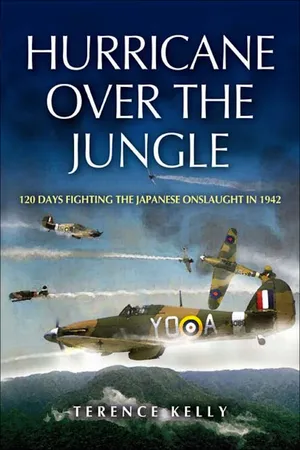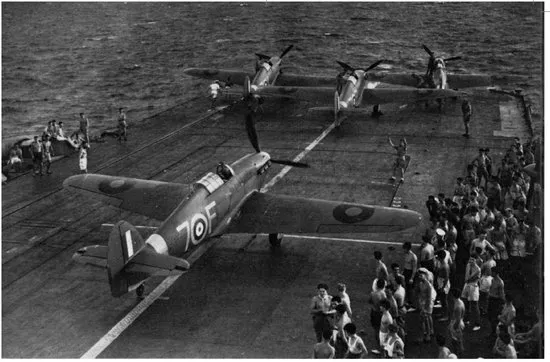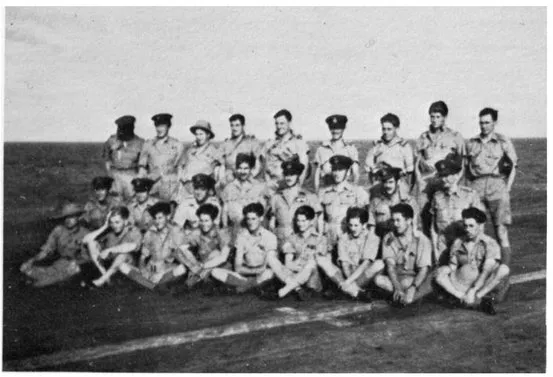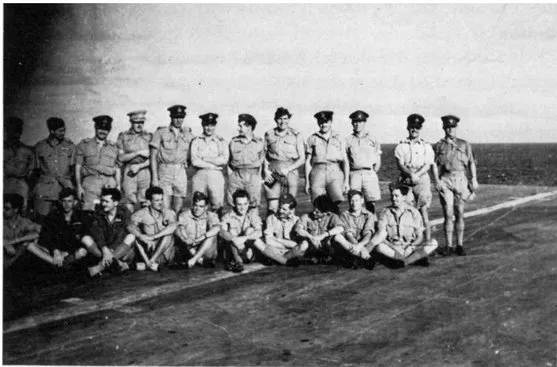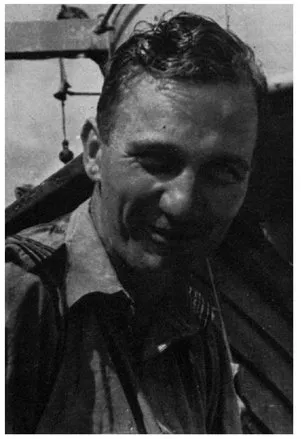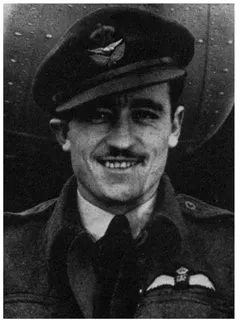![]()
CHAPTER THREE
Across the Indies to Singapore
On January 9th 1942 HMS Indomitable with John Morse in command weighed anchor from Port Sudan to set off southwards down the Red Sea carrying in addition to her own crews and aircraft 48 pilots and Hurricane IIs which were to fly off her deck at some new point ‘X’ for some new destination which had yet to be disclosed; half of the pilots were of 258 Squadron, the other half of 232.
It is necessary to pause and explain what later might otherwise seem an error for in fact 232 Squadron would, long before the Indomitable had reached Point X, be operating in Singapore.
On November 11th 1941, the ground staff of 232 Squadron and the ground staffs of each of Numbers 17, 135 and 136 Squadrons all equipped with Hurricane 11bs had sailed from Liverpool in a large convoy for a destination as yet unannounced but obviously the Middle East because of the equipment issued. Of the pilots of these four squadrons only six of each sailed with the crews, the balance remaining in England to follow later. By the time the convoy had reached Durban the Far East war had broken out and the decision was taken that 232 Squadron should be detached from the Wing of four squadrons and the six pilots of each of the other squadrons actually in the convoy posted to it. Thus a full squadron with 24 pilots and, in fact, 51 Hurricanes allocated to it could be sent by sea with all possible speed to Singapore. This smaller convoy sailed from Durban on December 24th, arriving in Singapore on January 13th, to be saved from destruction in a most determined bombing attack on approaching harbour only by a fierce tropical storm. By January 19th, the squadron was in action operating from the two airfields of Seletar and Kallang.
Hurricanes taxiing to stern of HMS Indomitable.
Meanwhile the balance, nineteen pilots, had left Ouston, where they had been stationed, for Padgate and thence Greenock from whence, on December 7th, they had sailed on a troopship arriving at Freetown on December 23rd and at Takoradi on December 29th (with the exception of the Commanding Officer, Squadron Leader Llewellin and a Flight Commander, Flight Lieutenant Julien who had flown on ahead to Khartoum and thence to Cairo). They were thus just two days ahead of 258 Squadron and had travelled in the same manner by Pan American to Khartoum and, subsequently, Port Sudan, having from various sources picked up, as did 258 Squadron, the odd pilots necessary to make their numbers up to squadron strength of 24.
The fortunes of these two squadrons were henceforth to be interwoven although each largely retained its identity; there was a degree of intermingling socially, yet never at any time a sense of integration and little more than passing interest in each other’s exploits.
Indomitable was quite a different kettle of fish from Athene. There was naturally a degree of segregation between sergeants and officers, but the gulf in quality of sleeping quarters much diminished. One could sling a hammock anywhere and in fact after a day or two I abandoned mine altogether and took to sleeping on a kind of shelf I discovered on the port side of the edge of the Indomitable, and being able to lie and hear the gentle hiss of a quiet sea a hundred feet below and watch the stars swinging in the sky I envied no one. It would be absurd to suggest I would not have preferred to be commissioned but it was only a question of time and patience. In any case I only had my own obstinacy to blame. I had been educated at a public school with Officers Training Corps against which I took an initial, never to be removed, objection following from the induction on my first day at school by a Sergeant Major who pronounced that membership of the OTC was compulsory and it followed from that that ‘if you didn’t bloody well like it you’ll bloody well have to lump it, won’t you!’
I decided then and there I wouldn’t like it and I’d lump it as little as I could so that at my commission interview I was obliged regretfully to announce that for all of five years in an OTC I had not even attempted ‘B’ certificate and had remained a private from first till last.
But here at last, on Indomitable, a dividend was being paid to obstinacy – instead of sharing some sweltering cabin on the starboard side, I was cool and fresh in my cubby hole, afloat it seemed in the air itself, with salt in my nostrils instead of oil and the light by which my thoughts were lit, the phosphorescence and the stars.
These were the nights. The days were pleasant too. I played a lot of bridge and poker but mostly the days were spent on deck, pacing with others, disbelievingly, the flight deck, refusing mentally to accept it was possible to unstick in so ridiculously short a length. There were a few odd incidents but not too many – just one of note. Indomitable carried its own Hurricanes for defence which were catapulted off. Under their bellies were great hooks which when the pilot landed caught in the arrester wire, it being accepted that it was impossible to land and stop a Hurricane in the length of the flight deck otherwise. There was a man called ‘Bats’ who held in his hands two indicators like table tennis bats with long handles, not unlike those for directing passenger aircraft into their terminal bays on landing, and one of his tasks was to wave a pilot to go round again if he appeared to be over-shooting.
On this occasion Bats so instructed but the pilot either misreading the signal or preferring his own judgement continued his approach until by the time he decided perhaps he had better go round again he had left it fractionally too late and his hook caught in the arrester wire at the precise moment he opened up his throttle. And there, for fascinating moments, the matter rested doubtfully. The Hurricane stayed where it was, motionless, ten feet above the deck, pointing to the sky like some huge bird straining at a leash, its engine roaring and its propeller creating a tremendous gale. The wire on the other hand, taut as a V-shaped iron bar, resisted. It was clear neither would give way and the expression on the poor pilot’s face was a study in consternation. In the end it was propeller torque which settled things slowly turning the Hurricane to the port side of the ship to deposit it as the pilot throttled back and the hook was slipped in the most undignified of positions athwart a gun turret.
No. 258 Squadron pilots on flight deck of Indomitable (author left end front row).
No. 232 Squadron pilots on flight deck of Indomitable – S/L, Wright, later to become Commanding Officer 605 Squadron in Java, seventh from left in back row.
But best of all were the many hours we spent sitting on the very front edge of the Indomitable. This was cambered in the most restful and convenient manner and there was a little fence which provided a footrest all the way along. One was suspended over the sea and could feel the prow cut the glorious blue of the Indian Ocean and watch the flying fish leap and scatter and fly like Spitfires by the hour. And again we would comment as we had in Khartoum that really it was the most wonderful of wars and the important thing to see it never ended.
On January 27th having seen no land apart from the incomparably beautiful green and white foaming surf and the yellow green palm studded horseshoe of the Chagos Archipelago the two squadrons were summoned to a flight deck briefing delivered by the ship’s commander.
It had of course been accepted by now that it was the Japanese we were booked to fight and here, on a blackboard erected on an easel, the commander chalked their advances so far as known. In Malaya the enemy were as far south as Mersing, about one hundred miles from Singapore itself and as it so happened on that very day – and who knows but perhaps at that very hour – General Percival made the decision to fall back to the island. Meanwhile in Burma, invaded from Siam, Moulmein had fallen; in Sarawak, Kuching had gone and Miri in Brunei. In Borneo there had been landings at Balikpapan and only a day or two before near Kendari in the Celebes. The Americans in the Phillipines were being severely pressed after landings at at least six places in Luzon and Mindanao and the great glittering prizes of Sumatra with its oil and Java with its food and sixty million people lay naked, unprotected.
258 Squadron C/O S/L ‘Jock’ Thomson.
I suppose it would have been proper for the forty-eight young men ranged in a semi-circle, in their khaki shirts and shorts with their detachable brevets pinned over their left breasts and their motley peaked or forage caps or pith helmets on their heads, to have been, if not alarmed, at least sobered by these revelations. But they were not. The sun was hot, the sea was sparkling blue, the breeze soft and steady – and there was excitement and adventure in the air. The map drawn on the blackboard meant nothing to most of them and they had heard of few of the places spoken of before. They didn’t know with any sense of certainty quite where in the world they were, their geography being in most cases abysmal. As for the Japanese with their feeble wooden biplanes, they seemed as the scent of a drag hunt or a drogue in firing practice. It was almost as if someone had arranged their presence as an excuse for this splendid jamboree.
But the Commander’s voice was grave and he spoke stirringly of the deeds of derring-do they would no doubt soon perform, assured them he was sure the world would hear of them and wished them luck. They listened with due politeness, a trifle embarrasssed by these eulogies and having in spite of all his efforts conceived no real grip on the proposition broke away with some relief to have a drink or two and talk it over.
What was curious was that no one thought to ask if anyone had any idea of the performance and equipment of the Japanese Air Force and no one thought to volunteer to us such information. Perhaps no one knew. At all events it never crossed our minds that in any field the machines we should have to fight could be superior to our Hurricanes. After all before the war the word ‘Japanese’ was almost an adjective for rubbish.
At dawn on January 28th, the first sixteen Hurricanes were raised by the lift and packed herringbone fashion at the stern of the Indomitable and by the time the day had broken bright and clear and the sea had lost its greyness we had run up our engines, checked our instruments, made sure our kitbags were secure in the bellies of the fuselage and had stowed away the few odd pieces such as razors and revolvers in side pockets and camera gun mountings.
There was nothing left to do but wait. We climbed down from the cockpits, paced the now shortened deck still disbelieving, checked and rechecked our maps trying to grasp locations, harried the meteorological officer, chatted and smoked – and tried to ignore our beating hearts. It was not until midday that we were ordered back into the cockpits and even then there was a long tense wait for the arrival of the escorting Blenheims; for an hour perhaps we sat, helmets on gunsights or hung loose around our necks. We were so far as I can remember: Thomson, Healey, Glynn, McAlister, Campbell, Kleckner, Lambert, Sharp, White, Keedwell, Scott, McCulloch, Dobbyn, Macnamara, Nash and me. We were, I suppose, a little self important, rather proud, not ashamed to feel sentimental about a rather unique companionship we shared. We certainly felt apart from other men once we were as now sitting in our cockpits with the familiar smell of mingled dope and oil in our nostrils. Our lives, after all, were three dimensional.
Flt/Lt ‘Denny’ Sharp who subsequently operated with Wingate in Burma.
The Blenheims came and Thomson was the first to go – Squadron Leader ‘Jock’ Thomson posted to 258 quite recently, in fact barely three months before, replacing Clouston DFC who had been a fierce dark man with a formidable personality, a name to conjure with in flying history and who was, although we were yet to learn this, already in Singapore commanding 488 New Zealand Squadron. Beyond the fact that he was a regular and reputed to be a first class pilot we knew little of Thomson really – a man with an intensely difficult task ahead, to take over from a legend at a time when his squadron was to be abruptly plunged into a muddle of inefficiency, crushed morale and ignorance.
Anyway off he went ambling, it seemed, along the flight deck and was gone steadily, smoothly upwards. Ken Glynn, Junior, was his Number Two. He taxied out and opened the throttle; down came the nose, up came the tailplane, along the pitiful length of flight deck roared the Hurricane and at the end, dropped out of sight and disappeared. It was very disconcerting.
Third off was ‘A’ Flight, Flight Commander to whom I was, as very frequently, flying Number Two – Flight Lieutenant ‘Denny’ Sharp, piratically good looking with a wicked eye, heavy brows, uneven teeth and a smal...
